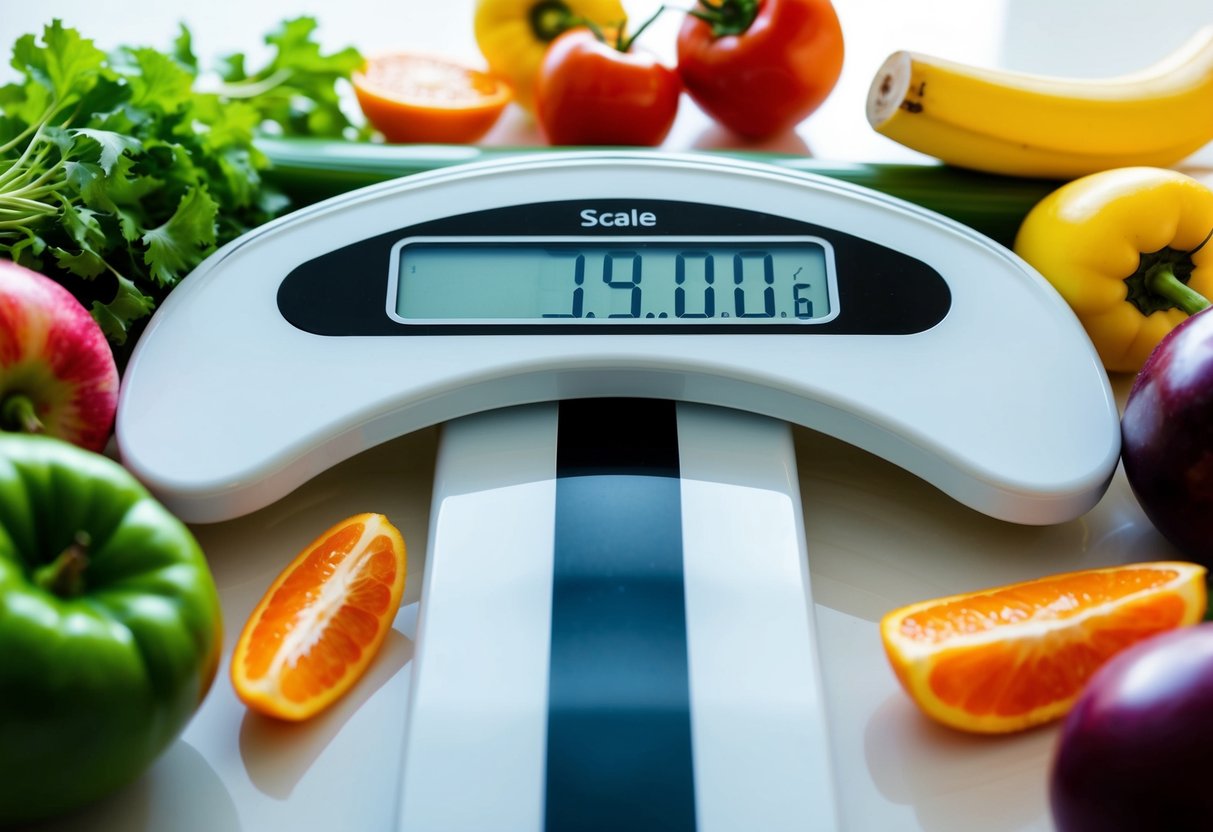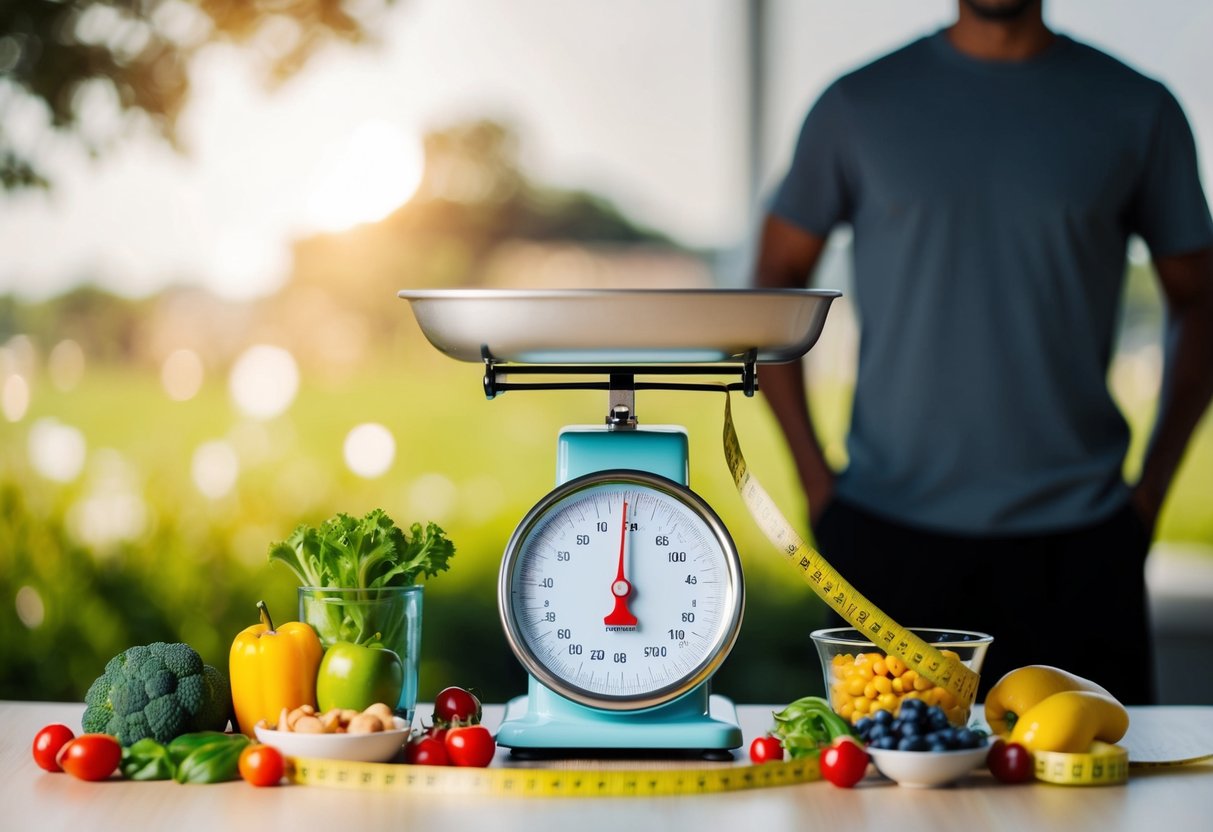When it comes to shedding pounds quickly, many people seek effective and safe methods. Healthy eating, regular exercise, and mindful lifestyle choices combine to create a path to losing weight fast. Understanding these strategies can empower individuals to make healthier decisions and jumpstart their weight loss journey.

Adopting a balanced diet rich in nutrients while engaging in consistent physical activity are essential steps. Building habits that promote long-term well-being can lead to sustainable results beyond just rapid weight loss. This blog post will explore practical tips and techniques that can help anyone looking to achieve their weight loss goals.
Key Takeaways
- Balanced nutrition is crucial for rapid weight loss.
- Regular physical activity enhances fat burning and metabolism.
- Sustainable habits support long-term weight management.
Understanding Weight Loss

Weight loss involves a mix of biological, psychological, and social factors. Knowing how metabolism works, the impact of obesity, and the psychological aspects of eating can help in achieving weight loss goals.
The Role of Metabolism
Metabolism refers to the body’s ability to convert food into energy. It plays a crucial role in weight loss. A faster metabolism burns more calories, contributing to fat loss. Factors influencing metabolism include age, gender, muscle mass, and activity level.
For example, muscle tissue burns more calories than fat tissue. Thus, increasing muscle through strength training can boost the metabolism. Many people may also experience metabolic changes during weight loss, slowing down calorie burning.
In some cases, a slower metabolism may lead to weight regain after dieting, making it essential to maintain a balanced lifestyle that includes regular exercise and healthy eating habits.
Impact of Obesity and Overweight
Obesity and overweight significantly affect health, leading to serious conditions such as diabetes and cardiovascular disease. When a person carries excess weight, their body struggles with everyday tasks, raising the risk of these diseases.
The body may develop insulin resistance, causing higher blood sugar levels and possibly resulting in type 2 diabetes. Additionally, excess fat can strain the heart, increasing the risk of hypertension and heart disease.
Losing even a small percentage of body weight can improve health markers. For instance, shedding just 5-10% of body weight can lower blood pressure and improve blood sugar levels.
Psychological Aspects of Eating
Eating habits are often influenced by emotions and mental health. Many people eat in response to stress, sadness, or boredom, leading to unwanted weight gain.
Understanding emotional triggers can help individuals make healthier choices. Keeping a food diary may reveal patterns that connect feelings to eating.
Furthermore, developing mindfulness about food choices encourages healthier eating. This practice helps in recognizing hunger and fullness cues, leading to better portion control.
Overall, addressing psychological factors is crucial for successful weight loss and maintaining a healthy lifestyle.
Nutritional Strategies for Fast Weight Loss

Making smart food choices is crucial for effective weight loss. Focusing on macronutrients, exploring intermittent fasting, and understanding food labels can significantly enhance one’s efforts to shed pounds efficiently.
Macronutrient Balance
Getting the right balance of macronutrients—protein, fats, and carbohydrates—is essential for weight loss. Protein plays a key role in controlling appetite. Foods like fish, eggs, beans, and lentils are excellent protein sources. Aiming for 20-30% of daily calories from protein can support muscle retention.
Healthy fats, found in avocados, nuts, and olive oil, also aid in satiety. They can make meals more satisfying. Carbohydrates should come from whole foods like fruits, vegetables, and whole grains rather than added sugars and processed products. Including high-fiber foods, such as legumes and vegetables, can help keep hunger at bay and promote digestive health.
Intermittent Fasting
Intermittent fasting (IF) is an eating pattern that alternates between eating and fasting. Many find it easier to restrict calorie intake this way. Common methods include the 16/8 method, where one fasts for 16 hours and eats during an 8-hour window.
IF may enhance weight loss by reducing overall calorie intake and improving insulin sensitivity. During eating periods, it’s important to focus on nutrient-dense foods—like vegetables, lean proteins, and healthy fats—to maximize nutrition and support weight loss efforts.
Understanding Food Labels
Reading food labels is crucial for making informed choices. Labels provide information about calories, serving sizes, and key nutrients. Paying attention to calorie intake helps in maintaining a suitable deficit for weight loss.
Look for hidden sugars and high sodium levels as they can undermine weight loss goals. Ingredients are listed in order of quantity, so the first few items are significant. Prioritizing whole foods with minimal processing and a shorter ingredient list can lead to healthier decisions, making weight loss more manageable.
Effective Exercise for Rapid Weight Loss

Exercise plays a crucial role in losing weight quickly. It can help boost the metabolic rate and promote fat burning. Different types of workouts can enhance weight loss efforts.
Cardiovascular Workouts
Cardiovascular workouts, often known as cardio, are effective for burning calories. These exercises include activities like walking, running, swimming, and cycling. They get the heart rate up and increase oxygen flow.
Engaging in cardio for at least 150 minutes a week can support weight loss. High-intensity interval training (HIIT) is especially effective. It combines short bursts of intense effort with rest periods, maximizing calorie burn.
Popular cardio workouts include:
- Running: Fast and effective for burning calories.
- Cycling: Great for leg strength and endurance.
- Swimming: Provides a full-body workout with low impact.
Doing a mix of these activities not only adds variety but also keeps motivation high.
Strength Training Benefits
Strength training is essential for building muscle mass. Increased muscle boosts the metabolic rate, which means the body burns more calories at rest. This can aid in rapid weight loss.
Exercises like weight lifting, resistance bands, and bodyweight workouts help develop strength. Focusing on major muscle groups—legs, back, and chest—can provide the best results.
It is recommended to include strength training at least two days a week. This helps in maintaining muscle while losing fat.
Some effective strength exercises include:
- Squats: Work primarily on the lower body.
- Deadlifts: Engage multiple muscle groups.
- Push-ups: Strengthen the upper body and core.
Incorporating Physical Activity into Daily Life
Incorporating physical activity into daily routines is key for those seeking rapid weight loss. Simple changes can make a significant difference.
Activities such as taking the stairs instead of the elevator, walking during breaks, or biking to work can increase overall movement.
Even household chores like cleaning and gardening can serve as exercise.
Setting small, achievable goals keeps motivation high. Tracking daily steps with a pedometer can encourage more activity.
Simple daily actions can contribute to a higher level of physical activity, thus aiding weight loss efforts significantly.
Behavioral Changes for Weight Management

Behavioral changes play a key role in successful weight management. Focusing on sleep, mindful eating techniques, and building sustainable habits can significantly enhance weight loss efforts.
The Importance of Sleep
Sleep is crucial for weight management. Research shows that inadequate sleep can lead to increased levels of cortisol, a hormone linked to weight gain. When sleep is disrupted, it affects metabolism and can lead to cravings for unhealthy foods. Aiming for 7-9 hours of quality sleep each night can help regulate appetite and improve overall health. Establishing a calming bedtime routine, such as limiting screen time before bed, can foster better sleep quality. Creating a dark, quiet sleep environment can also enhance sleep efficiency. Individuals will notice that better sleep not only aids weight loss but also supports mental well-being.
Mindful Eating Techniques
Mindful eating encourages individuals to focus on their food and the eating process. This means paying attention to hunger and fullness cues, which can prevent overeating. People can start by eating slowly and savoring each bite. Keeping distractions away, like phones or TVs, during meals can help individuals stay present. Additionally, maintaining a food diary can identify emotional triggers that lead to unhealthy eating. By recognizing these triggers, they can make better choices. Practicing portion control by using smaller dishes can create the perception of larger servings. This leads to satisfying meals with fewer calories, making it an effective strategy for weight management.
Building Sustainable Habits
Creating sustainable habits is essential for long-term weight loss success. Gradual changes are more effective than drastic diets. Emphasizing whole foods, such as fruits, vegetables, lean proteins, and whole grains, can improve gut bacteria, which play a role in metabolism. Setting realistic and achievable goals can keep individuals motivated and prevent frustration. Additionally, incorporating regular physical activity into daily routines—like walking or cycling—helps reinforce these habits. Social support, whether from friends or family, can provide encouragement and accountability. Focusing on consistency rather than perfection allows for a healthier relationship with food and exercise.
Hydration and Weight Loss

Staying hydrated is essential for anyone aiming to lose weight. Proper hydration can help control hunger and improve overall health. Drinking enough water and understanding how beverages like coffee can affect weight loss can be useful.
Benefits of Drinking Water
Drinking water plays a significant role in weight loss. It helps to boost metabolism and allows the body to burn more calories effectively. When a person drinks water before meals, it can increase the feeling of fullness. This often leads to eating fewer calories during that meal.
Hydration also supports the body’s functions, including digestion. Drinking adequate amounts of water helps maintain energy levels. People who are well-hydrated may find it easier to exercise, leading to more calorie burn. Studies indicate that many individuals do not meet the daily recommended intake of water, which is about 3.7 liters for men and 2.7 liters for women, including all fluids consumed.
Effects of Caffeine
Caffeine, often found in coffee, can also aid in weight loss. It increases metabolism and helps the body burn fat. Caffeine stimulates the central nervous system, which can improve exercise performance. This boost can lead to burning additional calories during workouts.
However, while caffeine can aid hydration, it is important to consume it in moderation. Excessive caffeine can lead to dehydration. Many people enjoy coffee as part of their routine, but pairing it with water is essential. This balance helps to maintain hydration levels while still enjoying the benefits of caffeine. It can also reduce cravings, making it easier to stick to a weight loss plan.
Lifestyle Adjustments for Faster Results

Making smart changes to daily habits can lead to quicker weight loss. Adjusting meal planning, food choices, and reducing processed foods will help support this goal.
Meal Planning and Preparation
Effective meal planning is essential for fast weight loss. It helps individuals avoid unhealthy choices when hunger strikes. By planning meals ahead, one can focus on balanced nutrition.
Creating a weekly menu can save time and energy. Preparing meals in advance makes it easier to stick to a lower-calorie or low-carb diet. Using smaller plates can also help control portion sizes, which can prevent overeating.
Batch cooking healthy meals and snacks can simplify choices during busy days. This strategy ensures healthy options are always available, reducing the temptation to grab quick, unhealthy foods.
Smart Food Choices
Choosing the right foods aids in faster weight loss. Emphasizing whole, nutrient-dense foods can lead to better results. Foods such as fruits, vegetables, lean proteins, and whole grains should be prioritized.
Incorporating more fiber into meals helps with feelings of fullness. This can be achieved by adding beans, whole grains, and plenty of vegetables. Aiming for lower-calorie options is beneficial over time.
Eating slowly and mindfully can also enhance food enjoyment and satisfaction. This practice gives the brain time to recognize fullness, which can prevent overeating. Pairing mindful eating with smaller portion sizes further supports weight loss efforts.
Avoiding Processed Foods
Avoiding processed foods is crucial for effective weight loss. Many processed foods contain added sugars, unhealthy fats, and high calories. These elements can contribute to weight gain.
Instead, focus on whole, unprocessed foods. Fresh ingredients tend to provide better nutrition and fewer empty calories. Building meals around fresh proteins, vegetables, and healthy fats can promote weight loss.
Reading labels is essential when shopping. Knowing what is in the food helps individuals make better choices. Reducing processed foods in the diet can lead to increased energy and improved overall health.
Maintaining Healthy Weight Loss

Successful weight loss doesn’t stop at the initial goal. It’s about developing consistent habits that support ongoing healthy living. Key areas to focus on include evaluating weight loss plans, ensuring balanced meals, and managing weight plateaus.
Evaluating Weight Loss Plans
When maintaining weight loss, it is essential to assess the effectiveness of the current weight loss plan. People should consider whether the plan is sustainable and fits their lifestyle. A successful plan should include a balance of nutrients while avoiding empty calories. A focus on whole foods, like non-starchy vegetables and plant-based proteins, ensures that the diet remains nutritious.
It is also helpful to track daily intake and monitor progress. This can reveal areas for improvement and help maintain motivation. Regular check-ins may highlight any necessary adjustments and keep the weight loss journey on track.
Role of Balanced Meals
Balanced meals are crucial for healthy weight maintenance. A typical plate should consist of:
- Fruits and vegetables: Incorporate a variety of colors to ensure a range of nutrients.
- Whole grains: These provide dietary fiber, which aids digestion and helps control hunger.
- Lean proteins: Plant-based proteins, such as beans and lentils, are excellent options.
By focusing on these components, individuals can avoid excessive insulin spikes that contribute to weight gain. Moreover, balanced meals help maintain energy levels while reducing cravings and promoting fullness.
Dealing with Weight Plateaus
Weight plateaus can be frustrating. They occur when weight loss stalls despite continued efforts. To overcome this, individuals might consider changing their routine. Here are some strategies:
- Increase physical activity: Adding variety to workouts can boost metabolism.
- Adjust calorie intake: Sometimes reducing calories slightly can help resume progress.
- Reassess meal composition: Ensuring meals are balanced and rich in dietary fiber may help break through the plateau.
Adopting these methods can support steady progress and ensure long-term weight maintenance.
Frequently Asked Questions
This section addresses common questions about weight loss strategies. It covers effective methods for quick results and examines the safety and realism of various approaches.
What are some effective strategies for rapid weight loss in 2 weeks?
To achieve rapid weight loss in two weeks, one can focus on a combination of diet and lifestyle changes. Cutting out processed foods and sugar can help. Additionally, increasing water intake and eating more fiber-rich foods can promote weight loss.
What are natural and permanent methods for losing weight quickly?
Natural methods include eating whole foods, cooking at home, and staying active. Focusing on a balanced diet that features fruits, vegetables, lean proteins, and whole grains is important. These methods not only aid in quick weight loss but also encourage sustainable habits.
Is it possible to lose weight swiftly without engaging in exercise?
It is possible to lose weight without exercise by controlling calorie intake through diet alone. However, incorporating physical activity generally enhances weight loss results and contributes to overall health. Simple changes, like taking walks or increasing daily movement, can make a difference.
How can one achieve significant weight loss within a month?
Significant weight loss in a month typically requires a multifaceted approach. Adopting a low-calorie diet, focusing on nutrient-dense foods, and maintaining a consistent eating schedule help. Setting realistic goals and tracking progress can also support this effort.
What are some unconventional but extreme methods for losing weight?
Some extreme methods include very low-calorie diets or fasting. While these can lead to quick results, they often pose health risks and are not sustainable long-term. Consulting with a healthcare professional before attempting any extreme method is essential.
Is it realistic to expect to lose 20 pounds within a single month?
Losing 20 pounds in one month is generally not realistic for most people. A safe and sustainable rate of weight loss is about 1 to 2 pounds per week. Rapid weight loss can lead to health complications and often results in regaining the weight quickly.









